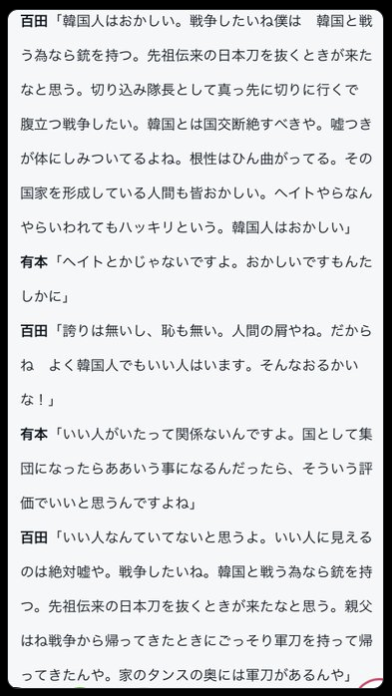飯山あかり氏が日本保守党代表の百田尚樹氏と事務総長の有本香氏の会話を収録した過去のビデオを紹介してる。会話は下記のようなもの。
飯山氏の情報もとはどうやら@like_pulp Xアカウントの投稿のようだ。
https://x.com/like_pulp/status/1723681918326288458
この投稿には元の動画とおもわれるニコニコ動画のリンクが張られてある。
https://t.co/k3mWKRvUGs
ーーーー 会話 ーーーー
百田 「韓国人はおかしい。戦争したいね僕は。韓国と戦うためなら銃を持つ。先祖伝来の日本刀を抜くときが来たなと思う。切り込み隊長として真っ先に切りに行く。腹立つ。戦争したい。韓国とは国交断絶すべき。嘘つきが体にしみついてるよね。根性はひん曲がっている。その国家を形成している人間も皆おかしい。ヘイトやらなんやら言われてもハッキリという。韓国人はおかしい。」
有本 「ヘイトじゃないですよ。おかしいですもん、たしかに」
百田 「誇りはないし、恥もない。人間の屑やね。だからね、よく韓国人でもいい人はいます[という人もいる])。そんな[ん]おるかいな。」
有本 「いい人がいたって関係ないですよ。国として集団になったらああいうことになるんだったら、そういう評価でいいと思うんですよね。」
百田 「いい人なんていないと思うよ。いい人に見えるのはぜったい嘘や。戦争したいね。韓国と戦うためなら銃を持つ。先祖伝来の日本刀を抜くときが来たなと思う。親父はね、戦争から帰ってきたときにごっそり軍刀を持って帰ってきたんや。家のタンスの奥にしまってあるんや。」
https://www.youtube.com/watch?v=CzmxamM7q5Q



